Trainees from diverse backgrounds at different stages of their career development enrich the Department of Cell Biology research environment and, through their tireless efforts, advance our scientific mission. As our trainees develop core competencies, they build scientific, professional, and career skills that facilitate career transitions and help build successful STEM careers. Our trainees contribute to cutting-edge scientific research, explore professional development opportunities, and contribute to the scholarship of the wider academic community at Emory and beyond. We celebrate the commitment and success of all of our dedicated trainees. We further recognize the exceptional achievements of the following trainees, who were nominated and vetted by a faculty advisory committee.
Postdoctoral Fellows
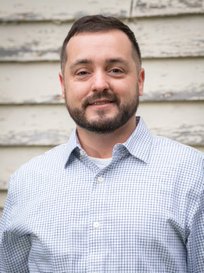
Brandon Carpenter, PhD
Postdoctoral Fellow
Lab: Katz Lab
I am a first-generation college graduate who, before joining Dr. David Katz’s lab, obtained my M.S. in Cell and Molecular Biology from Appalachian State University and received my Ph.D. in Cell and Developmental Biology from the University of Michigan, Ann Arbor. I then transitioned to Emory University to complete my postdoctoral training with Dr. Katz, supported by an NIH IRACDA Research and Science Teaching (FIRST) fellowship and an individual NIH National Research Service Award (NRSA F32) fellowship. My work on how histone methylation is inherited and maternally reprogrammed led to a first-author manuscript that was featured in Development (Carpenter et al. 2021, Development). My most recent work shows that maternal reprogramming of histone methylation is facilitated by the conserved co-repressor, CoREST. In addition, I was invited to give a talk about my work as part of their Development presents…webinar series (Development presents…Brandon Carpenter) and as part of the Society for Developmental Biology Postdoc Seminar Series. My most rewarding experience as a postdoc was collaborating with Dr. Karen Schmeichel from the Biology Department at Oglethorpe University to incorporate my C. elegans research into their biology curriculum, leading to co-authorship on a pedagogy manuscript (Lee et al. 2019, CourseSource). In the Fall of 2021, I am excited to inspire the next generation of scientists when I start my independent position as Assistant Professor of Molecular and Cellular Biology at Kennesaw State University!
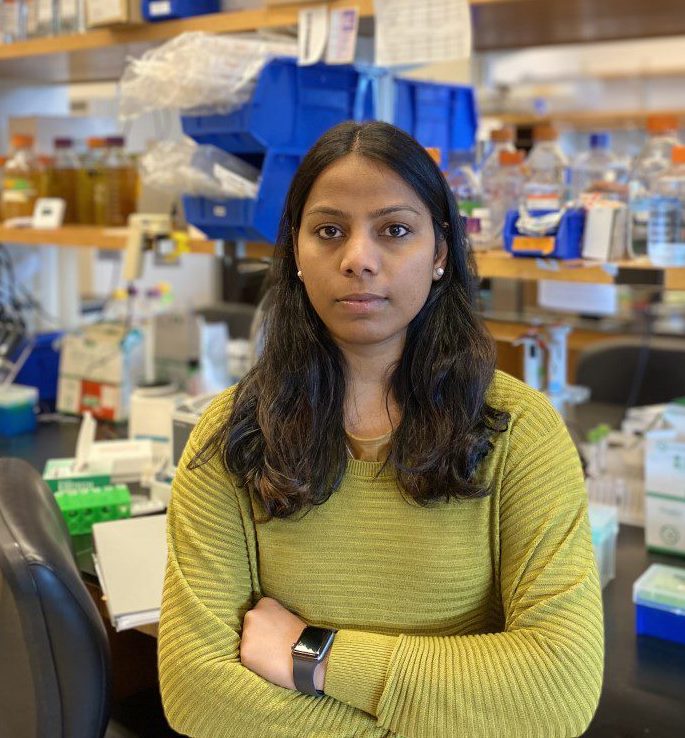
Janani Parameswaran, PhD
Postdoctoral Fellow
Lab: Jiang
I graduated with a degree in Life Sciences from Bharathidasan University, India, and received my Ph.D. from the Neuroscience at Bellvitge Biomedical Institute, Spain. I continued my research career as a post-doctoral fellow in Dr. Jie Jiang’s lab at Emory University in 2019, where I study disease mechanisms in Amyotrophic Lateral Sclerosis (ALS) and Frontotemporal Dementia (FTD) caused by C9orf72 repeat expansions and other novel genetic mutations. Mutations in the KIF5A gene were recently identified as genetic causes of ALS. The objective of my project is to unravel the underlying disease mechanisms by applying an unbiased proteomic approach to identify novel binding partners to the mutant KIF5A and evaluate their therapeutic relevance in different model systems, including Drosophila and human iPSC derived motor neurons. I was awarded the prestigious Milton Safenowitz Postdoctoral Fellowship by the ALS Association in 2021 to continue this study. In addition, I lead another project to determine the contribution of C9ORF72 repeat-containing RNAs to ALS/FTD pathogenesis (manuscript in preparation). In the last two years, I have co-authored one research paper identifying variants in MYH15 that modifies ALS risk (Kim H, et al. Human Molecular Genetics, 2019) and an invited review paper describing the RNA-mediated toxicity in C9orf72 ALS/FTD (McEachin Z, Parameswaran J, et al., Neurobiology of Diseases, 2020). I have also mentored several undergraduate and rotating graduate students in the lab.
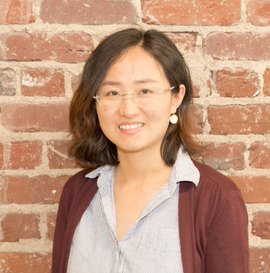
Junnan Fang, PhD
Postdoctoral Fellow
Lab: Lerit
I received my Ph.D. in Biochemistry and Molecular Biology from the Institute of Biophysics, Chinese Academy of Sciences in 2015, where I studied the structure and function of centromeric chromatin, resulting in a first-author publication in Genes & Development and several co-author publications. After graduation, I completed a short postdoctoral fellowship, which led to another first-author publication. In March 2018, I joined Dr. Dorothy Lerit's Lab at Emory to continue researching the mechanisms underlying cell division. Since then, I have enjoyed visualizing how centrosomes organize thousands of synchronized nuclear divisions within Drosophila embryos using confocal microscopy (Fang and Lerit, 2020). In the Lerit lab, we combine multidisciplinary methods, including biochemistry, fly genetics, high-resolution imaging, and image analysis to address how centrosomal mRNA is post-transcriptionally regulated. Through a collaborative, co-first author study, I revealed that the centrosomal mRNA centrocortin is regulated by Fragile X Mental Retardation protein to facilitate error-free mitosis (Ryder*, Fang*, and Lerit, 2020). In a project supported by my postdoctoral fellowship from the American Heart Association, I am currently investigating the post-transcriptional regulation of another centrosomal mRNA, pericentrin-like protein. Throughout my training, I developed a strong interest in studying centromere and centrosome functions using various methods at the molecular, cellular, and animal levels. I hope to apply for academic faculty positions in the near future and continue to research the regulation of centrosomal gene expression.
Graduate Students
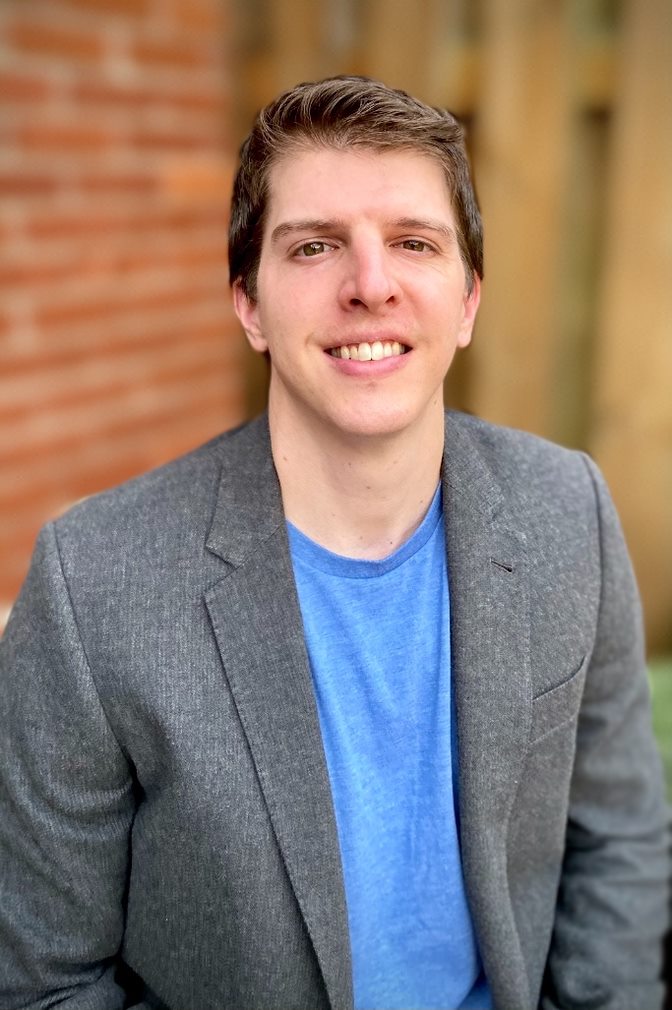
Joseph Behnke
Graduate Student
Lab: Zheng
I was raised in Princeton Junction, NJ and started my higher education journey at Rutgers University. While there, I majored in Cell Biology and Neuroscience and played Division I (American) football. I witnessed several teammates of mine retire from their athletic careers due to concussions and head trauma, and observing this first-hand served as motivation to better understand the brain and related illnesses. This interest led me to Emory, where I enrolled as an MD/PhD student and conducted my dissertation research in the lab of Dr. James Zheng, where I created a model of repetitive head trauma using Drosophila melanogaster to investigate the long-term consequences of head injury (Behnke et al. Sci Reports, 2021). This work also gave rise to a novel approach to study neurodegeneration in Drosophila whole-brain mounts using standard staining techniques combined with advanced microscopy to visualize vacuole neurodegeneration within the fly brain (Behnke et al. STAR Protocols, 2021). I am excited to see how we and others continue to use the fly to study basic mechanisms of neurodegeneration related to head trauma, which offers several key benefits over traditional models of head trauma, including genetic tractability and high-throughput screening potential. My academic pursuits outside of the lab have taken shape in the form of a podcast series, called Behind the Microscope, which features conversations with exemplary scientists, physicians, and physician-scientists who share their career trajectories and pearls of wisdom gained along the way. Using this platform, we seek to unveil the unwritten curriculum and challenges of academia and research that so often leads to trainees falling through the so called “leaky pipeline.” Since finishing my PhD, I returned to medical school to continue my clinical training with long-term aspirations of conducting research and treating neurological illness as a physician-scientist.
Kamyra S. Edokpolor
Graduate Student
Lab: Bassell
I am currently a fifth year Neuroscience Graduate Program student conducting my Ph.D. thesis in Dr. Bassell’s lab. My thesis focuses on understanding the connection between the loss of an RNA binding protein, Mbnl2, dysregulated inhibitory components, and how they may underlie various central nervous system symptoms in the neuromuscular disease, Myotonic Dystrophy Type I. I have greatly appreciated the tremendous support I have received to drive this project forward which I anticipate will lead to a first author publication submission this winter 2021. My first year in Dr. Bassell’s lab, I attended a two-week Cold Harbor Spring laboratory course on Advanced techniques in Neuroscience, funded by the NIH Training Grant in Integrative Biology: Neuroscience. Following that, I secured an NIH Research Supplement to Promote Diversity in Health-Related Research. In 2021, I was awarded the Myotonic Dystrophy Foundation pre-doctoral trainee fellowship, which provides funding, engagement with the foundation’s programming, and opportunities to present/attend at their domestic and international conferences. In 2019, I received the Neuroscience Graduate Program Graduates in Neuroscience (GIN) Service Award, and in 2020 I was featured in WeRep STEM, which is a virtual platform highlighting diversity in STEM, and also gave an oral presentation at the first BlackinNeuro conference. Additionally, I am very involved with social justice initiatives within the greater Atlanta community and enjoy volunteering and mentoring at an organization called Just Us Girls.
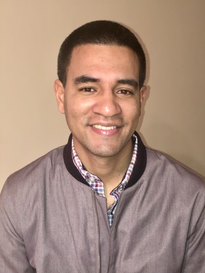
Juan Daniel Rodriguez
Graduate Student
Lab: Katz
I am a Ph.D. candidate in the Department of Cell Biology working with Dr. David Katz. Before enrolling at Emory, I earned my master’s degree in Integrated Biology at Kennesaw State University in Georgia, studying the role of the proton channel in a bioluminescent dinoflagellate species. From this work, I published my first first-author publication. Before that, I obtained my bachelor’s degree in Biomedical Science from the InterAmerican University of Puerto Rico. My current research uses C. elegans to study how epigenetic modifications can regulate embryo development and cell fate determination. From my work in the Katz laboratory, I published two publications so far, including a first-author Genetics study employing mouse genetics. My Ph.D. research has been supported by an NIMH Institutional Research Training Grant (T32) and a Ruth L. Kirschstein National Research Service Award (NRSA) Individual Predoctoral Fellowship (F31). Last year, I was selected to be part of the Yale Ciencia Academy. Using the knowledge from this program, I organized multiple outreach activities with different universities of Puerto Rico. At Emory, I maintain actively involved with the Hispanic community. As the elected President of the Latinx Graduate Student Association, one of my goals is to support Emory-Latinx students and recruit more Latinx to the Emory graduate programs.

